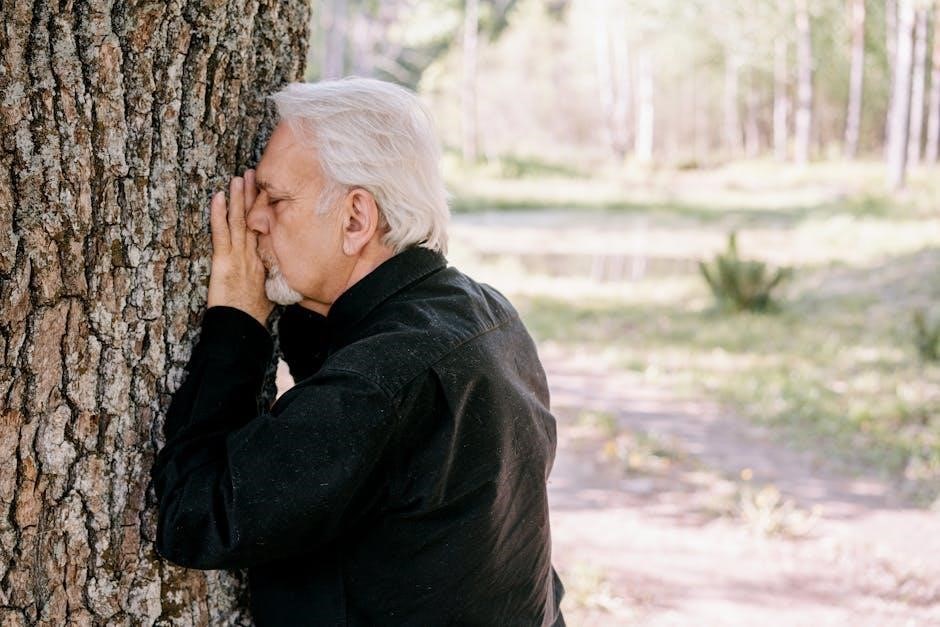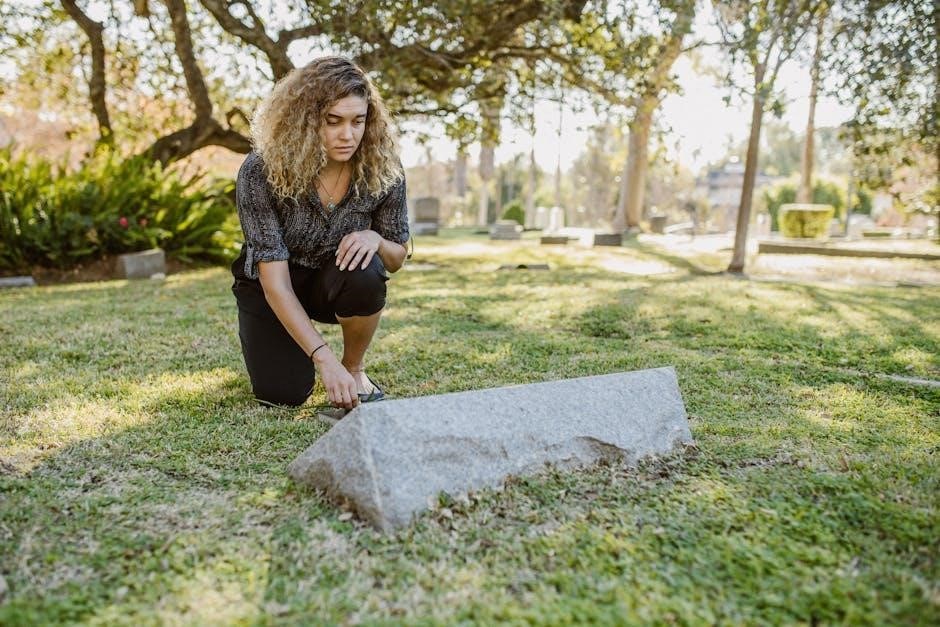The holiday season can intensify feelings of loss‚ as cherished memories and traditions often trigger grief. This section offers strategies to navigate this emotional period with grace‚ fostering healing while honoring loved ones.
Understanding the Unique Challenges of Grief During Festive Seasons
Holidays often emphasize joy‚ togetherness‚ and celebration‚ which can intensify feelings of loss and isolation for those grieving. The festive atmosphere‚ filled with reminders of happy memories‚ can create emotional overload. Social pressures to participate in traditions or gatherings may clash with the desire to grieve privately. Additionally‚ the absence of a loved one during events meant for sharing can deepen sorrow. Recognizing these challenges is the first step toward navigating the complex emotions that arise during this time.

Emotional and Psychological Impact of Grief During Holidays
Grief during the holidays can intensify emotions like sadness‚ loneliness‚ and nostalgia. The festive atmosphere may heighten feelings of loss‚ making it harder to cope with memories.
Recognizing Common Emotions and Thoughts Associated with Holiday Grief
Holiday grief often brings intense emotions such as sadness‚ loneliness‚ and nostalgia. Feelings of denial‚ anger‚ or bargaining may resurface‚ intensifying the sense of loss. The festive atmosphere can trigger memories‚ making it harder to cope. Many experience a mix of guilt‚ depression‚ or acceptance‚ as the absence of a loved one feels more pronounced. It’s important to acknowledge these emotions‚ as they are natural responses to loss. Recognizing these feelings is the first step toward navigating the emotional challenges of the season.
The Role of Memories and Triggers During the Holiday Season
Holidays often stir vivid memories of loved ones‚ making their absence feel more profound. Familiar sights‚ sounds‚ and traditions can act as emotional triggers‚ evoking sadness‚ nostalgia‚ or longing. These moments may feel overwhelming‚ as they reconnect us to past joys now tinged with loss. Recognizing these triggers is key to understanding their impact on grief. While painful‚ such memories also serve as a connection to cherished times‚ allowing us to honor our loved ones in meaningful ways during the season.
Practical Tips for Navigating the Holidays While Grieving
Adjust traditions to comfort‚ set boundaries‚ seek support‚ and practice self-care. Honoring loved ones through small acts brings solace and preserves their memory.
Creating New Traditions to Honor Your Loved One
Developing new traditions can help bridge the gap between grief and celebration. Consider lighting a candle‚ sharing stories‚ or creating a memory table. These acts keep their memory alive while fostering comfort and connection. Small rituals‚ like planting a tree or donating to a cause they cherished‚ can also provide meaning. By integrating their legacy into new practices‚ you honor their presence in your life and create a sense of continuity during the holidays.
Setting Boundaries to Protect Your Emotional Well-Being
Setting boundaries during the holidays is crucial for emotional well-being while grieving. It’s okay to say no to events or traditions that feel overwhelming. Communicate your needs clearly to loved ones‚ allowing yourself space to rest or step away when needed. Prioritize activities that bring comfort and avoid those that exacerbate pain. By honoring your limits‚ you create room for healing and self-care‚ ensuring you navigate the season in a way that feels authentic and sustainable for you.
Engaging in Activities That Promote Healing and Comfort
Engaging in meaningful activities can provide comfort and foster healing during the holidays. Consider participating in rituals‚ such as lighting a candle or creating a memory box‚ to honor your loved one. Creative outlets like writing‚ art‚ or music can also help express emotions. Physical activities‚ such as walking or yoga‚ can reduce stress and promote well-being. Volunteering or connecting with others who understand your grief may offer solace. These activities can help you navigate the season with purpose and find moments of peace amid sorrow.
Seeking Support and Connection
Seeking support from loved ones‚ support groups‚ or counseling can provide comfort and guidance during the holidays‚ helping you feel less alone in your grief journey.
The Importance of Leanings on Friends and Family
Friends and family can provide invaluable emotional support during the holidays‚ helping to ease the loneliness of grief. Openly sharing memories and feelings with loved ones fosters connection and understanding. Their presence can offer comfort‚ reminding you that you’re not alone in your journey. Leaning on others doesn’t weaken you; it strengthens your ability to navigate difficult emotions. Encouraging honest communication and shared moments can create a sense of unity and healing. Surrounding yourself with caring people helps honor your loved one while nurturing your well-being.
Joining Support Groups or Grief Counseling
Support groups and grief counseling provide a safe space to process emotions and share experiences with others who understand your pain. These resources offer guidance on navigating grief‚ especially during the holidays‚ when feelings of loss can intensify. Professional counselors can help develop coping strategies‚ while support groups foster connection and reduce isolation. Engaging with these resources can empower you to heal and find meaning‚ even in the midst of sorrow‚ by sharing stories and learning from others’ journeys.

Self-Care and Personal Well-Being
Prioritizing self-care during the holidays is crucial for emotional and physical healing. Engage in activities that promote mindfulness‚ rest‚ and self-compassion to nurture your well-being and resilience.
Practicing Mindfulness and Self-Compassion
Mindfulness and self-compassion are powerful tools for navigating grief during the holidays. By being present in the moment and treating yourself with kindness‚ you can reduce emotional overwhelm. Simple practices like deep breathing‚ meditation‚ or journaling can help you stay grounded. Remember‚ it’s okay to feel pain and take things slowly. Allow yourself the space to grieve without judgment‚ and embrace small moments of peace and comfort amidst the festivities.
Maintaining Physical Health During Grief
Grief can take a toll on physical health‚ making it essential to prioritize self-care. Ensure adequate nutrition‚ even if appetite is reduced‚ and stay hydrated. Regular sleep patterns help stabilize emotions‚ while gentle exercise‚ like walking‚ can reduce stress. Avoid substances like alcohol that may worsen emotional pain. Engage in activities that promote relaxation‚ such as yoga or meditation‚ to manage physical and emotional strain. Taking care of your body supports emotional resilience and aids in navigating the holiday season with greater strength.

Remembering and Honoring Your Loved One
Remembering your loved one during the holidays can bring comfort and healing. Consider creating meaningful rituals or memorials to honor their memory and celebrate their legacy.
Creating Meaningful Rituals or Memorials
Creating meaningful rituals or memorials can provide comfort and help honor your loved one during the holidays. Consider lighting a candle‚ displaying photos‚ or planting a tree in their memory. These acts can serve as therapeutic reminders of their presence in your life; Rituals such as sharing stories or cooking their favorite dish can also foster a sense of connection. Memorials‚ like donating to a cause they cherished‚ can offer a lasting tribute. These practices help integrate their legacy into your holiday celebrations‚ promoting healing and reflection.
Incorporating Their Legacy into Holiday Celebrations
Incorporating your loved one’s legacy into holiday celebrations can bring comfort and keep their memory alive. Consider continuing traditions they cherished‚ such as cooking their favorite recipe or engaging in activities they enjoyed. Displaying personal items like ornaments or photos can also serve as meaningful reminders of their presence. By weaving their legacy into your celebrations‚ you honor their impact on your life while creating a sense of connection and continuity. This practice can offer solace and help you navigate the holidays with a renewed sense of purpose and peace.

Spiritual or Cultural Practices for Coping with Grief

Spiritual or Cultural Practices for Coping with Grief
Spiritual or cultural practices can provide solace during grief. Rituals‚ prayers‚ or traditions offer comfort‚ helping to honor loved ones and find meaning in loss.
Exploring Religious or Spiritual Beliefs for Comfort
Religious or spiritual beliefs can offer profound comfort during grief‚ providing a sense of meaning and connection to loved ones. Many find solace in prayer‚ meditation‚ or attending religious services‚ which can foster a sense of peace and renewal. Rituals and ceremonies specific to one’s faith often honor the deceased while offering a structured way to process emotions. Engaging with spiritual communities can also provide emotional support and a shared understanding of loss. These practices help individuals navigate grief while finding strength in their beliefs and traditions.
Cultural Traditions That Support Grief and Healing
Cultural traditions can play a vital role in comforting those grieving during the holidays. Practices like Mexico’s Día de los Muertos‚ with its vibrant altars and celebrations‚ honor loved ones while fostering healing. Similarly‚ lighting candles or offering prayers in various cultures provides a meaningful way to connect with the deceased. These traditions often emphasize community support‚ helping individuals navigate loss collectively; By engaging in these rituals‚ people find solace in shared customs‚ creating a bridge between grief and healing that resonates deeply within their cultural identity.
Reflecting on the Healing Process
Reflecting on the healing process reveals a nonlinear journey of growth‚ acceptance‚ and renewal. It emphasizes the importance of patience and self-compassion during difficult times.
Understanding That Grief is a Journey
Grief is a deeply personal and unique journey‚ shaped by individual experiences and emotions. It is not a linear process but rather a series of stages‚ including denial‚ anger‚ bargaining‚ depression‚ and acceptance. While these stages are common‚ they vary in intensity and order for each person. Understanding that grief has no set timeline is crucial for healing. It’s important to allow yourself the space to feel and process emotions without judgment‚ recognizing that every step forward‚ no matter how small‚ is a part of the healing process.

Finding Hope and Renewal After Loss
Finding hope after loss is a gentle‚ gradual process that emerges from the darkness of grief. While the pain of loss remains‚ it can become a catalyst for growth‚ renewal‚ and deeper self-understanding. By creating meaningful traditions‚ seeking support‚ and practicing self-care‚ you can begin to heal and find light again. This journey is not about forgetting but about learning to live with loss while embracing the beauty of life and the memories that sustain you.
Embracing the holidays as a time for healing and growth‚ you can find hope and resilience. Grief remains‚ but so does the enduring love of your loved one.
Embracing the Holidays as a Time for Healing and Growth
The holidays can serve as a transformative period for healing; By acknowledging your emotions and creating meaningful rituals‚ you can find solace and renewal. Engaging in activities that honor your loved one‚ such as lighting a candle or sharing memories‚ can foster a sense of connection. This time allows you to reflect on cherished moments while gently moving forward. Healing is a journey‚ and the holidays offer an opportunity to embrace both grief and growth with grace and resilience.
Building a Future While Honoring the Past
Building a future while honoring the past involves creating new traditions that blend cherished memories with present realities. It’s about finding ways to celebrate life and love‚ even in absence. Setting boundaries to protect your emotional well-being is crucial‚ as is allowing yourself to embrace new experiences. Healing doesn’t erase the past but integrates it into a meaningful future. By navigating grief with intention and care‚ you can find hope and renewal without letting go of what truly matters.
